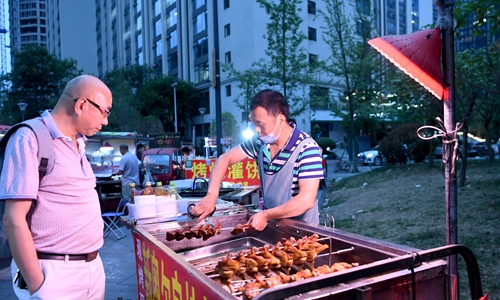China’s megacities urge cool heads amid street economy frenzy
Source:Global Times Published: 2020/6/8 16:50:19

A resident visits a barbecue stand on Tianfusanjie Road in Chengdu, Southwest China's Sichuan Province on Monday night. Chengdu was the first city in the country to loosen controls on the private stall economy on March 15. Photo: cnsphoto
Voices of caution are appearing in Chinese media urging the reasonable development of the street economy as street vendors rush to Chinese cities.
Government-backed newspapers in three out of China's four top-tier cities have issued opinion pieces calling vendors to avoid rushing to develop the street economy. An overwhelming rush could ruin years of urban management work, they said.
An opinion piece in the Shenzhen Special Zone Daily, owned by the Shenzhen Committee of the Communist Party of China (CPC), argued on Monday that the street economy is not a silver bullet and its development should meet local circumstances. Shenzhen is one of China's four largest cities, with a population of 13 million.
The op-ed piece pointed out the transportation, environment, health and city management concerns posed by a rush to develop the street economy.
The Beijing Daily, owned by the CPC Beijing Committee, was more straightforward in its Sunday editorial, declaring the street economy is unfit for Beijing.
Merchants without fixed operating venues could bring a host of "urban diseases" like traffic jams and environmental degradation, and may undo efforts in urban management, improving the city's image and achieving high-quality growth, it said.
The article said Beijing has its own means to ensure job stability and relief for those worst hit by the economic impact of the coronavirus outbreak.
The Guangzhou Daily, owned by the CPC Guangzhou Committee, ran a story of similar logic on Monday. Guangzhou is a city with a population of 15 million.
These voices appear to be addressing a sudden wave of interest in the street economy, which has been hotly discussed on Chinese social media since local authorities loosened their grip on street vending after years of restrictions in the sector. The government seeks to boost employment in the wake of the COVID-19 epidemic.
Domestic and foreign businesses, ranging from automakers to e-commerce sites to fast-food chains, have this week moved to enter the street economy since restrictions were lifted.
Chinese experts said the government's strategy to develop the street economy is a vital step in re-stabilizing the Chinese job market, boosting market vitality and shoring up people's incomes, but warned that in reality when a large number of entities rush into a sector the results may be disappointing. Some caution is needed amid the current trend of the street economy, experts said.
China's Central Civilization Committee office announced in late May that it would cease to include street vendors who occupy outdoor spaces or other public areas in city assessments for 2020, indicating a temporary relaxation on the tight management of the country's street food sector.
Many localities, including second and third-tier cities, have now been loosening restrictions on street vendors.
Posted in: ECONOMY